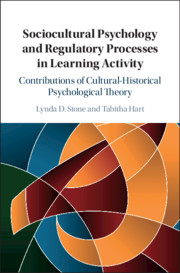 Sociocultural Psychology and Regulatory Processes in Learning Activity
Sociocultural Psychology and Regulatory Processes in Learning Activity Published online by Cambridge University Press: 30 September 2019
In Chapter 3, we offer practical-moral knowledge as a theoretical frame that can be used to understand the dynamic transactions between the historical construction of a social context and regulatory processes of learning. Practical-moral knowledge is socially embedded and emerges in formal and in formal learning communities. This form of knowledge is socially constructed and reconstructed from a continually emergent and shared semiotic (sign) system of rights, responsibilities, and duties that establishes legitimate actions and interactions for competent participation. This sign system is composed of social and moral orders and gives rise to a community ethos involving a code of conduct for regulating behaviors, a code always under revision as learners and the community co-develop. Learners (and their mentors/teachers) use locally constructed practical-moral knowledge to guide engagement in processes of self-, other-, and co-regulation.
To save this book to your Kindle, first ensure no-reply@cambridge.org is added to your Approved Personal Document E-mail List under your Personal Document Settings on the Manage Your Content and Devices page of your Amazon account. Then enter the ‘name’ part of your Kindle email address below. Find out more about saving to your Kindle.
Note you can select to save to either the @free.kindle.com or @kindle.com variations. ‘@free.kindle.com’ emails are free but can only be saved to your device when it is connected to wi-fi. ‘@kindle.com’ emails can be delivered even when you are not connected to wi-fi, but note that service fees apply.
Find out more about the Kindle Personal Document Service.
To save content items to your account, please confirm that you agree to abide by our usage policies. If this is the first time you use this feature, you will be asked to authorise Cambridge Core to connect with your account. Find out more about saving content to Dropbox.
To save content items to your account, please confirm that you agree to abide by our usage policies. If this is the first time you use this feature, you will be asked to authorise Cambridge Core to connect with your account. Find out more about saving content to Google Drive.